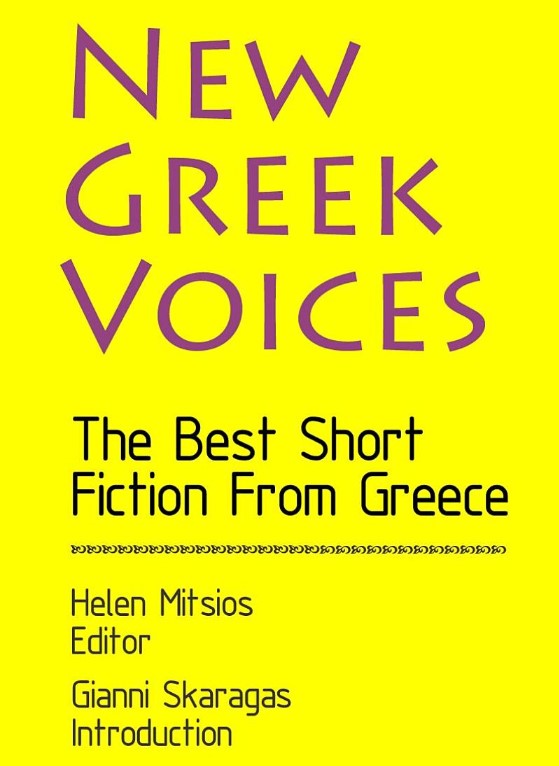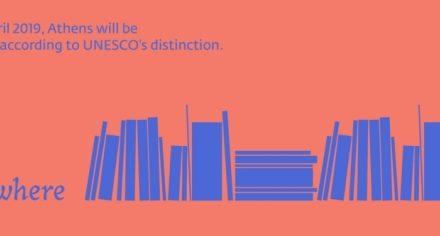New Greek Voices: The Best Short Fiction from Greece edited by Helen Mitsions brings together an exciting selection of short stories written by some of the most talented contemporary Greek writers, offering readers a fresh perspective on life, culture and identity in Greece. Each story reflects the complexities of modern society blending tradition with innovation, and illuminating the nuances of the human experience.

The book opens with an insightful introduction by Gianni Skaragas, a prominent figure in the literary community, whose words set the stage for readers highlighting the significance of these narratives in the global literary scenes. The writers include in the anthology – Ioanna Bourazopoulou, Yiannis Efstathiadis, Maria Fakinou, Alexandra K*, Angela Kastrinaki, Tefcros Michaelides, Amanda Michalopoulou, Maria Mitsora, Yannis Palavos, Vasiliki Petsa, Gianni Skaragas, Ersi Sotiropoulos, Soti Triantafyllou, Thanassis Valtinos, Zyranna Zateli- explore themes of migration, love, loss, hardship and resilience, inviting readers to connect deeply with the characters and their journeys.
Reading Greece* spoke to the anthology’s editor Helen Mitsios about the book, the main challenges she was faced with, the main themes the writers touch upon, as well as about what makes Greek literature appealing to an English-speaking audience.
Your latest editing venture New Greek Voices: The Best Short Fiction from Greece features 15 of the finest works from the most distinguished Greek writers today. Tell us a few things about the book.
The stories are from some of Greece’s most important contemporary writers. They’re producing dynamic and original fiction, really powerful work, and I’m proud to bring them to an English-speaking audience. Also, Gianni Skaragas, who is a brilliant writer, contributed a story and also wrote the introduction.
How did you embark on this venture? Which were the main challenges you were faced with?
My previous anthology projects were, in a way, my explorations of foreign cultures, extensions of my love of travel. Greek culture, on the other hand, has been familiar to me all my life. One day I realized that the experiences I’d gained doing my previous four anthologies had prepared me, maybe more than almost anyone, to bring this project to the world, and the seed was planted and took hold. There was an emotional and personal component too because I had a difficult relationship with my father who came from a village in Agrafa and had old world attitudes and beliefs. My father is no longer here, and I feel that doing this anthology honors him, and he would have been proud of me for putting it together.
Yes, an anthology always presents some challenges. It has a lot of parts and people involved. I spent many hours corresponding with the writers, translators, and literary agents. The great thing is these are such accomplished writers that they’re the most amazing email “pen pals.“ We spun off into a lot of subjects, like discussing War and Peace or Houellebecq and the merits of his different novels.

Helen Mitsios by Tony Winters
“These stories are like modern folktales, in that they instantly transport you to their authentic and magical worlds, and captivate and beguile you with characters that feel so real that when you are finished reading about them, you look around the room to see where they’ve gone…” Which are the main themes the writers touch upon in their short stories? Which were the criteria according to which you made the selection?
I look for a story that moves me emotionally. I follow my intuition and look for a level of storytelling excellence.
Do contemporary Greek writers have the potential to move beyond national borders and attract foreign readers? What is that make their works appealing to an English-speaking audience?
I think it’s a matter of representation and availability. This situation reminds me of my first anthology New Japanese Voices. At the time contemporary Japanese writers weren’t being published in English translation. Haruki Murakami was practically unknown in English when I published his short story. I’m not taking credit for this at all, but he’s gone on to be one of the most internationally acclaimed writers of our time. I hope the same will happen for some of the Greek writers in this collection. It doesn’t matter what country a story comes from. Our emotions are universal. The themes in New Greek Voices are recognizable: migration, love, loss, revenge, regret, financial hardship, resilience, identity, family, expectation, disappointment. I could go on. Like American country music, these stories are about all the important things in life.
*Interview by Athina Rossoglou
** Helen Mitsios is an award-winning poet, writer, and editor. She is author of the poetry collections The Grand Tour and If Black Had a Shadow. Her publications appear in a number of journals, newspapers, and magazines including The Washington Post Book World, The Washington Times World & I Magazine, The Philadelphia Inquirer, The San Francisco Chronicle, The St. Petersburg Times, Publishers Weekly, Brooklyn Rail, France-Amérique, and SPIN. She is a professor in the Language and Literature Department at Touro University in Manhattan, and a teaching member of the New York Writers Workshop. She pens the books column “Out of Print Books We Love” and is Books & Poetry editor at Wonderlust magazine.
Previous anthologies include: New Japanese Voices: The Best Contemporary Fiction from Japan (listed twice as a New York Times Editor’s Choice and New York Times Summer Reading Selection); Digital Geishas and Talking Frogs: The Best Short Stories from Japan; Beneath the Ice: An Anthology of Contemporary Icelandic Poetry; Out of the Blue: New Short Fiction from Iceland.
TAGS: LITERATURE & BOOKS | READING GREECE














